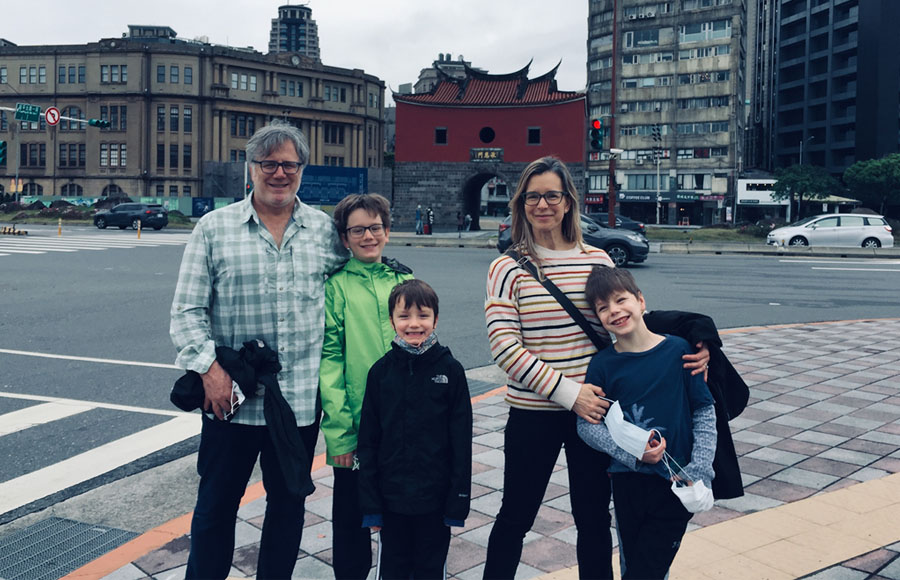
During his Fulbright assignment in Taiwan from March–December, Appalachian State University assistant professor Dr. Eric Karchmer, left, is studying how traditional Chinese medicine is being adapted to treat emerging diseases and illnesses, primarily in children. Pictured in Taiwan, he and his wife and App State colleague, Dr. Dana Powell, second from right, along with their children, remove their face coverings for this quick photo. Powell, an associate professor in App State’s Department of Anthropology, plans to continue her research on indigenous studies and environmental justice while accompanying Karchmer in Taiwan. Photo courtesy of Dr. Eric Karchmer

Dr. Eric Karchmer, assistant professor of anthropology at Appalachian State University, is the recipient of a 2020–21 Fulbright through the U.S. Fulbright Scholar Program. He is on a 10-month Fulbright assignment in Taiwan, where he is studying the role of traditional Chinese medicine in the management of children’s health in contemporary Taiwanese society. Photo submitted
BOONE, N.C. — Adapting traditional Chinese medicine to treat emerging diseases and illnesses, primarily in children, is the focus of Dr. Eric Karchmer’s Fulbright research in Taiwan. Karchmer, an assistant professor of anthropology in Appalachian State University’s Department of Anthropology, was awarded a 2020–21 Fulbright through the Fulbright U.S. Scholar Program.
The two-fold goal of his Fulbright project, according to Karchmer:
- To understand how Taiwanese families are handling the illnesses of their children, particularly ones that are new and emerging.
- To learn about the innovative strategies doctors of traditional Chinese medicine are developing for treating young patients.
While in Taiwan, Karchmer will shadow doctors of Chinese medicine, particularly pediatricians in their clinical practice, and follow volunteer families to explore how traditional healing strategies are being adapted to new medical concerns resulting from the challenges of raising families in a rapidly modernizing society.
“For much of the early 20th century, traditional Chinese medical practices were denigrated as an impediment to modernization, leading to a steady decline in this healing practice. But interest in Chinese medicine has been growing in recent years, within East Asia and around the world,” Karchmer explained.
Through his earlier research, Karchmer said he found parents and doctors of Chinese medicine are “concerned about the dangers of new foods, new commodities and rapid social changes that were unimaginable just a few decades ago.”
According to Karchmer, studies in Taiwan have shown a growing interest in using traditional Chinese medicine to help treat the following conditions:
- Children’s allergies.
- Tourette syndrome.
- Stomach disorders.
- Attention deficit hyperactivity disorder (ADHD).
- Young women’s menstrual irregularities.
He said there has also been a boom in demand for acupuncture to treat children with mental and neurological diseases, such as cerebral palsy and autism spectrum disorder.
“I believe this project will have great significance for helping to popularize some of the fascinating innovations that are happening in the world of Chinese medicine. … Doctors of Chinese medicine and parents are drawing on both the past and present, deploying old healing strategies to treat new dangers, and finding innovative ways to negotiate an uncertain future,” Karchmer said.

Dr. Eric Karchmer, assistant professor of anthropology at Appalachian State University, is the recipient of a 2020–21 Fulbright through the U.S. Fulbright Scholar Program. He is on a 10-month Fulbright assignment in Taiwan, where he is studying the role of traditional Chinese medicine in the management of children’s health in contemporary Taiwanese society. Photo submitted
The Fulbright Program, established in 1946 under legislation introduced by former U.S. Sen. J. William Fulbright, is sponsored by the U.S. Department of State’s Bureau of Educational and Cultural Affairs (ECA).
The program provides participants — chosen for their academic merit as well as leadership potential — the opportunity to study, teach and conduct research, exchange ideas, and contribute to finding solutions to shared international concerns. To date, more than 400,000 “Fulbrighters” have participated in the program since its inception.
In addition to his role at App State, Karchmer is a licensed acupuncturist and practitioner of Chinese medicine, treating patients in North Carolina for more than two decades.
Among his research areas of interest are science studies, medical anthropology, Chinese medicine and China studies, colonial and postcolonial societies, and ethnobotany — the study of how people make use of plants native to their region. He has taught Honors College courses on medical anthropology and directed the theses of three Honors College students.
Karchmer holds a Ph.D. from the University of North Carolina at Chapel Hill, as well as a bachelor’s degree from Princeton University and a second bachelor’s degree in medicine from the Beijing University of Chinese Medicine.
Dr. Yen Hung-Rong, a leading pediatrician at China Medical University in Taichung, Taiwan, is hosting and supervising Karchmer’s Fulbright project.
What do you think?
Share your feedback on this story.
About the Department of Anthropology
The Department of Anthropology offers a comparative and holistic approach to the study of the human experience. The anthropological perspective provides a broad understanding of the origins as well as the meaning of physical and cultural diversity in the world — past, present and future. Learn more at https://anthro.appstate.edu.
About the College of Arts and Sciences
The College of Arts and Sciences (CAS) at Appalachian State University is home to 17 academic departments, two centers and one residential college. These units span the humanities and the social, mathematical and natural sciences. CAS aims to develop a distinctive identity built upon our university's strengths, traditions and locations. The college’s values lie not only in service to the university and local community, but through inspiring, training, educating and sustaining the development of its students as global citizens. More than 6,800 student majors are enrolled in the college. As the college is also largely responsible for implementing App State’s general education curriculum, it is heavily involved in the education of all students at the university, including those pursuing majors in other colleges. Learn more at https://cas.appstate.edu.
About Appalachian State University
As a premier public institution, Appalachian State University prepares students to lead purposeful lives. App State is one of 17 campuses in the University of North Carolina System, with a national reputation for innovative teaching and opening access to a high-quality, cost-effective education. The university enrolls more than 21,000 students, has a low student-to-faculty ratio and offers more than 150 undergraduate and 80 graduate majors at its Boone and Hickory campuses and through App State Online. Learn more at https://www.appstate.edu.




![How NCInnovation Is Rethinking Economic Development in North Carolina [faculty featured]](/_images/_posts/2026/02/rethinking-economic-development-600x400.jpg)







